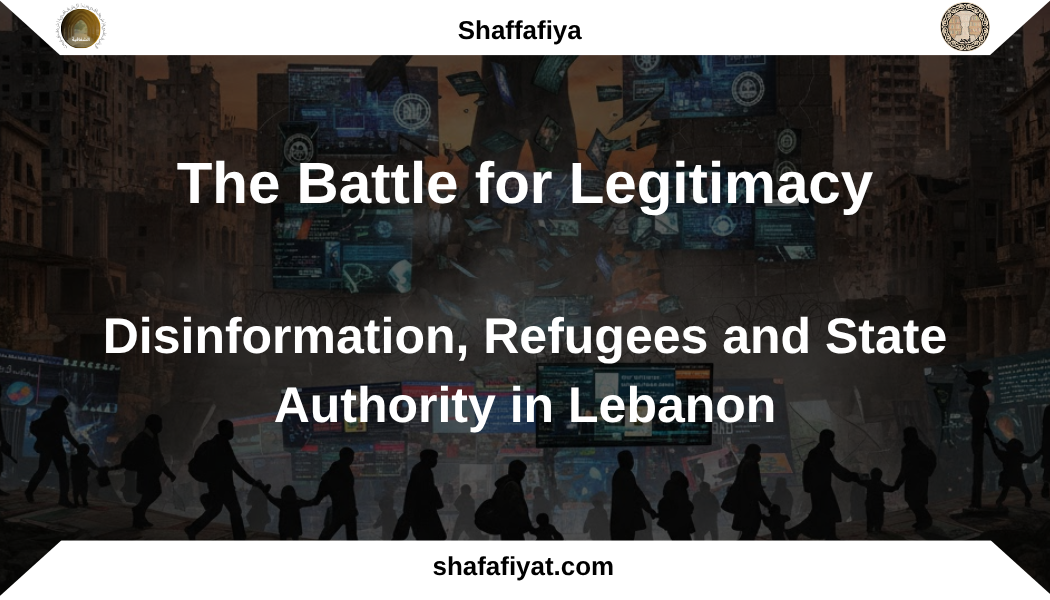
Lebanon’s governance crisis turns on two linked questions: who wields force, and who controls the narrative. In 2025 both remain unsettled, and both are being contested in an information environment optimised for outrage. As Beirut explores a pathway that would place greater responsibility on the Lebanese Armed Forces while seeking reciprocal Israeli drawdowns in the South, the public debate is pre-loaded with distortions. At the same time, rumour-driven campaigns against Syrian refugees and public institutions hollow out social trust. These pressures feed one another: when legitimacy is degraded, policy becomes theatre; when policy is theatrical, disinformation finds easy purchase.
Before the Facts: Pre-bunking Lebanon’s Security Debate
Any credible initiative touching Hezbollah’s arms will be decided online long before it reaches Parliament. The choreography is familiar. Anonymous channels purport to leak drafts and claim the existence of secret clauses; partisan accounts inflate or suppress polling to paint their preferred outcome as inevitable; activists on both extremes frame the proposal as either surrender or masterstroke. The middle ground—sequencing, verification, enforcement—rarely trends. In such conditions, pre-bunking is more valuable than rebuttal. Publishing a process note that sets out authorship, consultations and decision points equips journalists and citizens with a factual spine before rumours define the terms.
The refugee file reveals an equally corrosive pattern. Spikes in anti-refugee sentiment are catalysed by de-contextualised clips, recycled across pages and groups until they acquire the weight of fact. Headlines prioritise nationality where it is incidental; commentary offers vigilante “solutions” when legal and administrative pathways are the only responsible route. Policy ambiguity then becomes a force multiplier for falsehood. Without a coherent, rights-respecting approach to residency, labour and returns, the digital space substitutes rage for governance and political actors profit from televised “decisiveness”.
History and identity are routinely weaponised to foreclose compromise. Regional propaganda repackages Lebanese debates within broader civilisational frames—resistance versus crusaders, Arab honour versus Western puppets—bundling centuries into a morality tale that admits no nuance. The technique is hardly novel, but its efficiency in a fatigued public sphere is undeniable. Once a question is framed as existential, evidence is an afterthought and every deviating fact can be dismissed as enemy information warfare.
The South is where information and security most obviously converge. Patchy withdrawals, buffer strips and sporadic exchanges create a permanent grey zone in which a single unverified report—about a patrol, an incursion, a strike—can trigger panic in villages already stretched by displacement and poverty. This is not collateral; it is a tactic. Confuse the facts on the ground, then present non-state actors as the only reliable interpreters and protectors. The consequent erosion of confidence in the Lebanese Armed Forces and UNIFIL is not accidental; it is the point.
Lebanon’s media remains a national asset but operates under severe constraints. Power shortages, staffing losses and legal pressures sap editorial capacity. Into the vacuum step partisan outlets with production slickness and elastic ethics. The outcome is a brutal market test: cautious reporting, which admits uncertainty, loses to instant certainty, which flatters identity. Once audiences adopt the assumption that all sides are equally mendacious, only tribal cues matter. That is the disinformation operator’s victory condition.
Governing in a Fog: Countering Rumour While Rebuilding Authority
A defence is possible, but it must run through institutions rather than around them. The government and the Lebanese Armed Forces would benefit from a modest, standing deconfliction protocol with UNIFIL and major editors: short, time-stamped incident notes within a fixed window for events south of the Litani, stating what is known and what remains unverified. This is not messaging; it is procedure. By normalising timely, factual updates, authorities deny oxygen to rumour while avoiding the trap of advocacy.
Newsrooms can reinforce the centre by adopting simple guardrails on stories that inflame: verify with at least two independent sources; avoid highlighting nationality in headlines unless materially warranted; add official data context; and include lawful policy avenues rather than vigilante prescriptions. Civil society can monitor compliance and publish transparent scorecards, rewarding outlets that resist the cheap dopamine of outrage.
Platforms have obligations that can no longer be ducked. During escalations they should activate temporary friction on forwards in high-risk districts and deploy moderation teams fluent in Levantine Arabic. Contextual panels linking to a public rumour ledger—an open, searchable record of high-impact claims with status updates—would give users a neutral reference without privileging any political actor. Transparency in enforcement decisions, even if partial, would undercut the suspicion that removals are partisan.
Attribution matters, too. When state-linked actors engage in intimidation campaigns against Lebanese civilians online, public technical attributions—narrowly framed and legally vetted—raise the cost of repetition and educate the public about methods. Strategic silence might suit short-term diplomatic needs, but habitual silence breeds conspiracy and invites escalation. A measured naming policy, paired with discreet channels for de-escalation, strikes a better balance.
Education cannot be an afterthought. Two-hour, phone-centred micro-modules on media hygiene, delivered through schools, municipalities and unions, can lift the baseline of scepticism without breeding cynicism. The aim is modest: to make the average user pause before sharing, to recognise common manipulation tells, and to understand that admitting uncertainty is a strength, not a weakness.
Lebanon’s battle for legitimacy will not be won by rhetorical flourishes. It will be won by restoring the habit of believing verified facts and punishing those who profit from their inversion. Disinformation is not an abstract irritant; it is a tool that licenses vigilantism, sabotages diplomacy and corrodes institutions. The answer is not louder propaganda but steadier procedure: publish what is known, mark what is uncertain, and do it at a tempo that respects the audience’s attention. In a polity exhausted by improvisation, discipline is strategy.
If Lebanon can harden the public square in this way—less theatre, more verification—it will gain the breathing space required for any security settlement that reduces risks for civilians. That would not end the information war. It would, however, reset the terms of engagement in favour of those who have the harder task: governing.

